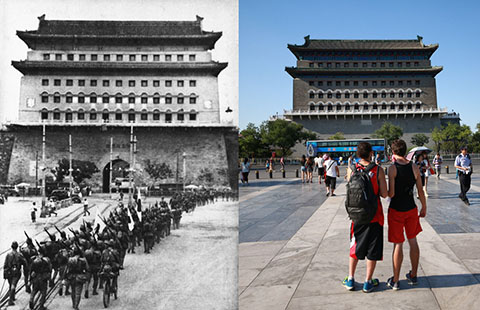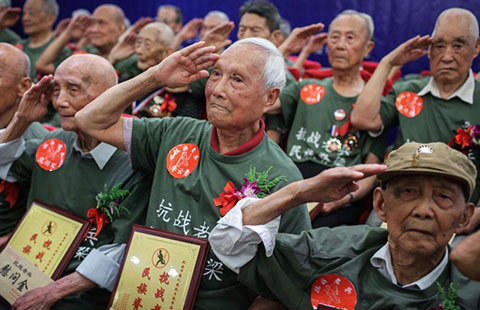Long-range bomber may be in China's plans
Updated: 2015-07-07 08:15
By Zhao Lei(China Daily)
|
||||||||
In February, President Xi Jinping, who is commander-in-chief of the PLA, inspected a PLA bomber unit in Xi'an, Shaanxi province, and boarded a "new-type bomber", which Western military observers said was an H-6K, China's most advanced bomber.
Military experts said Xi's attention to the bomber force will boost the PLA air force's effort to develop a new aircraft.
"President Xi has defined the PLA air force as a strategic force for China, urging the service to build offensive capability rather than only maintaining defensive strength, as it did in the past," said Wang Ya'nan, deputy editor-in-chief of Aerospace Knowledge. "So the air force must possess a long-range strategic bomber because without this weapon, you can't call yourself a strategic force, and you can never really own an offensive ability."
Xi's instruction was reiterated in May by PLA strategy planners who said in a military strategy white paper that the air force will strive to shift its focus from territorial air defense to obtaining both defensive and offensive capabilities.
Expectations differ
Without knowing the specifications for the new bomber, military experts have expressed different expectations. Wang of Aerospace Knowledge said China could consider a design similar to Russia's Tu-160.
"Our new bomber should be supersonic like the Tu-160, which means it can penetrate air defenses at extra-fast speed. But unlike the Russian plane, ours should have fixed wings rather than variable-sweep wings, which add complexity to the design and have become less useful in modern air operations," he said.
"In addition, I don't think we need to build a flying-wing aircraft such as the B-2, because such a plane will be too technologically and financially challenging for China. Must we invest an astronomical amount of resources to develop a Chinese version of B-2 just for its fancy appearance and questionable stealth capability?"
However, the view of Du Wenlong, a senior researcher at the PLA Academy of Military Science, contrasts with Wang's.
"Our new strategic bomber should feature high survivability and long-distance penetration, both of which require the aircraft to be low-observable," Du said. Though the Tu-160 is supersonic, its conventional configuration doesn't support stealth capability, Du said.
Shao Yongling, a military strategy professor at PLA Second Artillery Corps Command College, said that because today's air defense system is so advanced and dense, China's next-generation strategic bomber must have stealth capability as well as a large payload, which should at least be more than the six cruise missiles that can be carried by the H-6K.
zhaolei@chinadaily.com.cn
- Injured ROK tourists in intensive care
- 36 dead, 26 missing after banca capsized in C. Philippines
- Thai navy plans to buy three Chinese subs
- Mass casualties in Indonesian military plane crash
- Japan's LDP lawmaker denounces Abe's security policies
- More than 100 feared dead in Indonesian military plane crash

 Then and Now: Beijing’s historic sites as witnesses of war
Then and Now: Beijing’s historic sites as witnesses of war
 In photos: China from above
In photos: China from above
 Serena Williams beats sister Venus to reach last eight
Serena Williams beats sister Venus to reach last eight
 Culture insider: Six things you may not know about Minor Heat
Culture insider: Six things you may not know about Minor Heat
 Fancy sculptures sparkle in Chongqing
Fancy sculptures sparkle in Chongqing
 Ten photos you don't wanna miss - weekend special
Ten photos you don't wanna miss - weekend special
 US beat Japan 5-2 to win Women's World Cup
US beat Japan 5-2 to win Women's World Cup
 Veterans of World War II honored
Veterans of World War II honored
Most Viewed
Editor's Picks

|

|

|

|

|

|
Today's Top News
China answers Clinton charges
President Obama addresses IS threat
China has ability to deal with risks to economy: premier
Govt prefers peaceful means in resolving maritime row: Envoy
China predicts Greece to stay in eurozone
Chinese stocks struggle to maintain rally in afternoon
Greece enters uncharted territory after referendum 'no' vote
Chinese embassy warns travelers to be careful in Turkey
US Weekly

|

|







